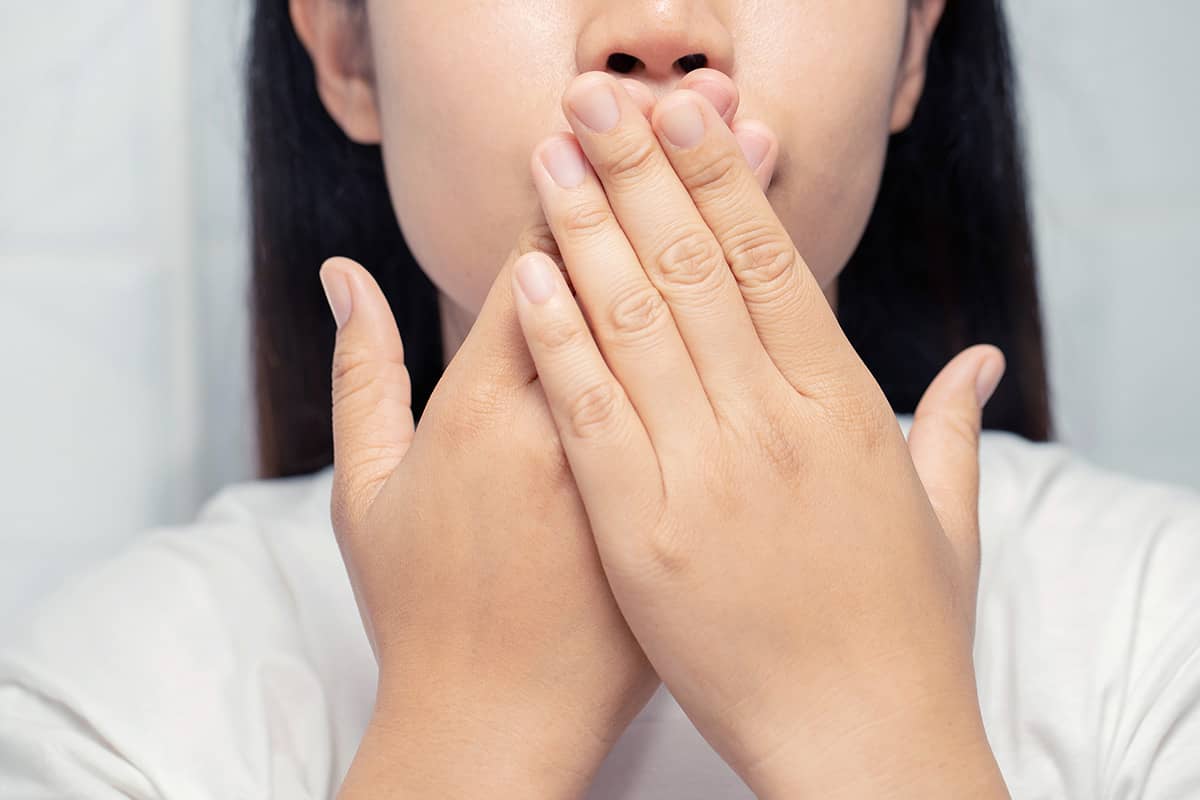
Solve your bad breath problems with fast treatments and the expertise of Dr. Gallardo. While bad breath can often be managed with home remedies, it sometimes signals a more serious issue. Bad breath affects millions and can make social situations uncomfortable. At Gallardo Periodontics & Implant Dentistry in Miami, Dr. Paul Gallardo identifies and treats the root causes of bad breath, offering effective solutions to help you regain fresh breath and confidence.
Don’t let bad breath affect your social life or health – call us today to schedule your consultation!
Say Goodbye to Bad Breath with Gallardo Periodontics
- Gallardo Periodontics treats bad breath at its source, offering lasting solutions for fresh breath and confidence.
- Professional cleanings at Gallardo Periodontics prevent bad breath by removing plaque and bacteria effectively.
- Gallardo Periodontics provides expert gum disease treatments to effectively target bad breath and restore oral health.
- Laser gum treatment at Gallardo Periodontics eliminates bacteria, restoring gum health and fresh breath.
- Early treatment at Gallardo Periodontics prevents worsening dental issues, saving time, money, and future complications.
Bad Breath Laser Treatment
For patients suffering from more advanced periodontal disease, our state-of-the-art dental laser treatments offer a minimally invasive option to remove infected tissue and kill bacteria. This treatment not only helps restore gum health but also effectively eliminates bad breath, showcasing the incredible benefits and results of laser therapy in modern dentistry.
The process utilizes advanced laser technology, making it gentle, quick, and promoting faster healing compared to traditional methods. It’s a great choice for anyone who wants a simple, long-lasting solution to improve their oral health and enjoy fresher breath. Let us help you feel confident again!
Don’t let bad breath linger! Professional treatments are the most effective way to solve the problem.
Call our Miami office today!
Other Professional Treatments for Bad Breath at Gallardo Periodontics
While home remedies like tongue scraping and drinking water may offer short-term relief, they often fail to address the underlying causes of chronic bad breath. At Gallardo Periodontics & Implant Dentistry, we offer a range of advanced treatments designed to eliminate bad breath at its source and provide long-term results.
1. Professional Dental Cleanings
Plaque and tartar build-up can only be fully removed by a professional cleaning. Our expert dental hygienists will thoroughly clean your teeth and gums, removing bacteria and debris that contribute to bad breath. Regular cleanings are essential for maintaining fresh breath and preventing gum disease, which is a leading cause of halitosis.
2. Fluoride Treatments
Strengthening your tooth enamel with fluoride not only protects against cavities but also helps reduce odor-causing bacteria. Fluoride treatments at Gallardo Periodontics are quick, painless, and highly effective in improving overall oral health and freshening breath.
3. Perio Protect Trays
If gum disease is contributing to your bad breath, our custom-fitted Perio Protect trays deliver medication directly to your gums to combat infection and reduce odors. This non-invasive treatment is easy to use at home and can dramatically improve both your gum health and breath.
Common Causes of Bad Breath and When to Seek Help
Bad breath can be triggered by a wide range of factors, some of which are simple to address with better hygiene, while others may signal more serious dental or medical conditions that require immediate attention. Understanding these causes can help you determine when it’s time to seek professional help.
- Poor Oral Hygiene: Buildup of plaque and tartar in the oral cavity allows bacteria to thrive.
- Bacteria on the Tongue: The tongue harbors odor-causing bacteria that release foul-smelling compounds.
- Dry Mouth: Reduced saliva flow, often caused by medication, dehydration, or mouth breathing, allows bacteria to grow.
- Gum Disease: Infections in the gums create spaces where bacteria accumulate, leading to persistent bad breath.
- Dental Cavities: Tooth decay in the oral cavity traps food particles and bacteria, causing odors.
- Smoking and Tobacco Use: Tobacco dries out the mouth and increases bacterial growth, contributing to bad breath.
- Sinus and Respiratory Infections: Conditions like sinusitis or bronchitis lead to mucus buildup and bacterial growth, causing bad breath.
- Tonsil Stones: Calcified debris in the tonsils can harbor bacteria and create foul odors.
- Dietary Choices: Foods like garlic, onions, and spices can cause temporary bad breath.
- Medical Conditions: Diabetes, acid reflux, and kidney or liver issues can produce distinct breath odors.
- Poorly Fitted Dental Appliances: Ill-fitting dentures or braces can trap food particles, leading to bacterial buildup and bad breath.

Do any of these causes sound familiar?
If you’re struggling with chronic bad breath, it’s time to get to the root of the problem. Schedule your appointment with Dr. Paul Gallardo in Miami today
Why You Shouldn’t Delay Bad Breath Treatment
Bad breath is more than just an inconvenience – it can be a sign of serious underlying dental issues like periodontal disease, infections, or tooth decay. Delaying treatment can result in the worsening of these conditions, leading to more complicated and costly procedures in the future. The sooner you address bad breath, the easier it is to treat.
At Gallardo Periodontics in Miami, we make it easy for you to get expert care right away. From routine cleanings to advanced periodontal treatments, Dr. Paul Gallardo has the experience and technology to tackle bad breath and restore your oral health.

Don’t wait until the problem gets worse
If you’re struggling with bad breath, SCHEDULE YOUR APPOINTMENT TODAY!
The Benefits of Early Halitosis Treatment
Acting early on bad breath can save you from more serious and costly dental issues. Here’s why scheduling an appointment with Dr. Paul Gallardo at Gallardo Periodontics in Miami is the smart choice:
- Prevent Gum Disease: Bad breath is often a sign of early gum disease. Treating it now can stop it from progressing into more severe conditions like periodontitis or tooth loss.
- Save Time and Money: Early treatment is quicker and more affordable. Prevent the need for expensive, complex procedures later by addressing the issue today.
- Protect Your Overall Health: Chronic bad breath can be linked to health conditions like diabetes and infections. Early intervention helps catch these issues before they worsen.
Don’t wait! Schedule your consultation with Dr. Gallardo today and experience the long-term benefits of early treatment.
Home Remedies for Bad Breath: A Quick Fix or a Temporary Solution?
While there are several home remedies and over-the-counter products that may help alleviate bad breath, they often only mask the problem temporarily. These include:
- Tongue Scraping: A helpful practice, but only effective for surface-level bacteria.
- Chewing Sugar-Free Gum: Stimulates saliva production but doesn’t address underlying conditions.
- Drinking Water: Staying hydrated is crucial, but persistent bad breath may indicate a larger issue.
If home remedies aren’t giving you lasting results, it’s time to seek professional care. Only a dental expert like Dr. Gallardo can assess your condition and provide a treatment plan that addresses the root causes of your bad breath.
Get real relief today! Call us to schedule your consultation with Dr. Gallardo.
Dr. Paul Gallardo: Miami’s Expert in Periodontal Care

With over 25 years of experience, Dr. Paul Gallardo is one of Miami’s leading periodontists, known for his expertise in treating complex dental issues, including chronic bad breath. His state-of-the-art practice offers a range of services designed to address both cosmetic and serious dental concerns, all tailored to each patient’s unique needs.
At Gallardo Periodontics & Implant Dentistry, you’ll receive personalized care in a welcoming environment, with advanced technology and treatments designed for lasting results. Whether your bad breath is due to gum disease, dental issues, or another condition, Dr. Gallardo and his team will work with you to develop the best treatment plan.
Take the first step toward fresh breath and a healthy smile – contact us today to schedule your consultation with Dr. Gallardo at our Miami office!